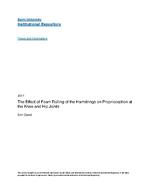|
|

Notes
- Abstract:
- Purpose: To determine the acute effect of two 1-minute bouts of hamstring foam rolling on proprioception at the knee and hip joints. Methods: Twenty-five subjects completed two proprioceptive tests on separate days, in a random order. The joint position matching test used no visual feedback. Right hip and knee angles were recorded as subjects were verbally guided to a target position, which was maintained for six seconds. After three seconds of rest, subjects reproduced this position without guidance for six seconds. Three trials were completed at baseline, as well as zero, 10, and 20 minutes post-intervention. In the force sense test, subjects completed three successive trials with visual feedback from a graph. They gradually applied flexion torque against the dynamometer until target torque was reached. Three more trials were completed without feedback from the graph. This test was also completed at baseline, and zero, 10, and 20 minutes post-intervention. Results: A significant main effect was found for absolute knee position matching error (F(1.97, 47.36), p = 0.004). No significant differences were found between post-intervention values at zero and 10 minutes, zero and 20 minutes, or 10 and 20 minutes for absolute hip position matching error or absolute knee torque matching error at zero, 10, or 20 minutes (p > 0.05). Conclusions: Foam rolling improved knee joint position sense for at least 20 minutes post-intervention and did not decrease hip joint position sense or knee joint force sense. This indicates that foam rolling may be used before, during, and after physical activity without the risk of injury due to proprioceptive deficits.
- Thesis:
- Thesis (M.S.)--Barry University, 2017.
- Bibliography:
- Includes bibliographical references (leaves 96-100).
Record Information
- Source Institution:
- Barry University
- Holding Location:
- Barry University Archives and Special Collections
- Rights Management:
- Copyright Erin David. Permission granted to Barry University to digitize, archive and distribute this item for non-profit research and educational purposes. Any reuse of this item in excess of fair use or other copyright exemptions requires permission of the copyright holder.
- Resource Identifier:
- RD97.D38 2017_DavidErin ( BU-Local )
- Classification:
- RD97.D38 2017 ( lcc )
|
|